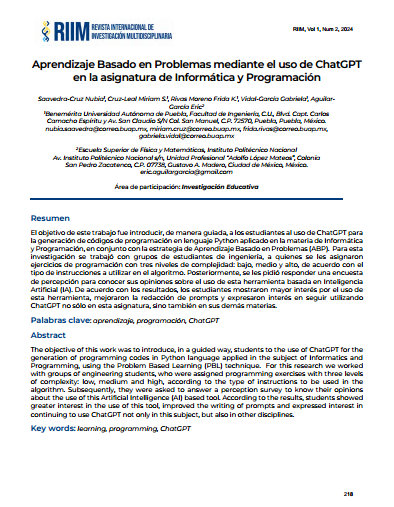Aprendizaje basado en problemas mediante el uso de ChatGPT en la asignatura de informática y programación
Keywords:
ChatGPT, Learning, ProgrammingAbstract
The objective of this work was to introduce, in a guided way, students to the use of ChatGPT for the generation of programming codes in Python language applied in the subject of Informatics and Programming, using the Problem Based Learning (PBL) technique. For this research we worked with groups of engineering students, who were assigned programming exercises with three levels of complexity: low, medium and high, according to the type of instructions to be used in the algorithm. Subsequently, they were asked to answer a perception survey to know their opinions about the use of this Artificial Intelligence (AI) based tool. According to the results, students showed greater interest in the use of this tool, improved the writing of prompts and expressed interest in continuing to use ChatGPT not only in this subject, but also in other disciplines.
References
F. A. I. Flores, D. L. C. Sanchez, R. O. E. Urbina, M. Á. V. Coral, S. E. V. Medrano, and D. G. E. Gonzales,"Inteligencia artificial en educación: una revisión de la literatura en revistas científicas internacionales," Apuntes universitarios, vol. 12, no.1, pp. 353-372, 2022. ISSN:2304-0335 doi:https://doi.org/10.17162/au.v12i1.974.
M. Martínez-Comesaña, X. Rigueira-Díaz, A. Larrañaga-Janeiro, J. Martínez-Torres, I. Ocarranza-Prado, and D. Kreibel, "Impacto de la inteligencia artificial en los métodos de evaluación en la educación primaria y secundaria: revisión sistemática de la literatura," Revista de psicodidáctica,
[En línea]. doi: https://doi.org/10.1016/j.psicod.2023.06.001.
F. J. García Peñalvo, F. Llorens Largo, and F. J. Vidal García, "La nueva realidad de la educación ante los avances de la inteligencia artificial generativa," RIED. Revista iberoamericana de educación a distancia, 2024. doi: https://doi.org/10.5944/ried.27.1.37716.
Kieran West , “Insights 2024: Attitudes to AI”, Elsevier, 13 de junio de 2024. [En línea]. Disponible en: https://assets.ctfassets.net/o78em1y1w4i4/6BWRibyJNQLYkKWwKw7SVf/64c04b53ca9cc0795ac811f583f7eebb/Insights_2024_Attitudes_To_AI_Full_Report.pdf.
J. L. Reyes, "Chat GPT: ¿cuáles son sus alcances y limitaciones?," Ciencia UNAM-DGDC, 9 de junio de 2023. [En línea]. Disponible en: https://unamglobal.unam.mx/global_revista/chat-gpt-cuales-sonsus-alcances-y-limitaciones/
A. Casheekar, A. Lahiri, K. Rath, K. S. Prabhakar and K. Srinivasan, "A contemporary review on chatbots, AI-powered virtual conversational agents, ChatGPT: Applications, open challenges and future research directions," Computer Science Review, vol. 52, pp. 100632, 2024. doi: https://doi.org/10.1016/j.cosrev.2024.100632.
S. Aktay, S. Gök and D. Uzunoğlu, “ChatGPT in education,” Türk Akademik Yayınlar Dergisi (TAY Journal), vol. 7, no. 2, pp. 378-406, 2023. doi: https://doi.org/10.29329/tayjournal.2023.543.03.
V. J. Guamán Gómez and E. E. Espinoza Freire, “Aprendizaje basado en problemas para el proceso de enseñanza-aprendizaje,” Revista Universidad y Sociedad, vol. 14, no. 2, pp. 124-131, 2022. ISSN 2218-3620.







